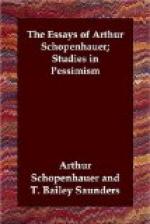But all this contributes to increase the measures of suffering in human life out of all proportion to its pleasures; and the pains of life are made much worse for man by the fact that death is something very real to him. The brute flies from death instinctively without really knowing what it is, and therefore without ever contemplating it in the way natural to a man, who has this prospect always before his eyes. So that even if only a few brutes die a natural death, and most of them live only just long enough to transmit their species, and then, if not earlier, become the prey of some other animal,—whilst man, on the other hand, manages to make so-called natural death the rule, to which, however, there are a good many exceptions,—the advantage is on the side of the brute, for the reason stated above. But the fact is that man attains the natural term of years just as seldom as the brute; because the unnatural way in which he lives, and the strain of work and emotion, lead to a degeneration of the race; and so his goal is not often reached.
The brute is much more content with mere existence than man; the plant is wholly so; and man finds satisfaction in it just in proportion as he is dull and obtuse. Accordingly, the life of the brute carries less of sorrow with it, but also less of joy, when compared with the life of man; and while this may be traced, on the one side, to freedom from the torment of care and anxiety, it is also due to the fact that hope, in any real sense, is unknown to the brute. It is thus deprived of any share in that which gives us the most and best of our joys and pleasures, the mental anticipation of a happy future, and the inspiriting play of phantasy, both of which we owe to our power of imagination. If the brute is free from care, it is also, in this sense, without hope; in either case, because its consciousness is limited to the present moment, to what it can actually see before it. The brute is an embodiment of present impulses, and hence what elements of fear and hope exist in its nature—and they do not go very far—arise only in relation to objects that lie before it and within reach of those impulses: whereas a man’s range of vision embraces the whole of his life, and extends far into the past and future.
Following upon this, there is one respect in which brutes show real wisdom when compared with us—I mean, their quiet, placid enjoyment of the present moment. The tranquillity of mind which this seems to give them often puts us to shame for the many times we allow our thoughts and our cares to make us restless and discontented. And, in fact, those pleasures of hope and anticipation which I have been mentioning are not to be had for nothing. The delight which a man has in hoping for and looking forward to some special satisfaction is a part of the real pleasure attaching to it enjoyed in advance. This is afterwards deducted; for the more we look forward to anything, the less satisfaction we find in it when it comes. But the brute’s enjoyment is not anticipated, and therefore, suffers no deduction; so that the actual pleasure of the moment comes to it whole and unimpaired. In the same way, too, evil presses upon the brute only with its own intrinsic weight; whereas with us the fear of its coming often makes its burden ten times more grievous.




